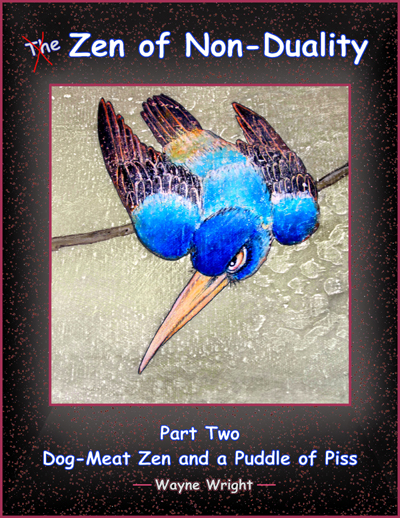
Zen of Non-Duality
Part Two
Dog-Meat Zen and a Puddle of Piss
That's what Zen is: Non-Duality
"Mind itself is not dualistic."
"...there are, Mahamati, those who have fallen into the dualistic way of thinking, being unable to comprehend the truth."
4 There Are No Teachers of Zen
“Real Zen Has No Transmission”
5 “Buddha Sells Dog Meat”
Great Master Wumen Scorches Buddha
6 Do Not Seek the Dharma
Master Mazu Says “No-Gate Is the Dharma Gate”
7 “Dried Poop on a Stick”
Irreverence, Vulgarity, and Aggression
8 Avoiding Conceptualism
Bodhi-mind Just Happens
9 Afterword
Opening Both Eyes at the Same Time
Master Huineng (“Whey-nung” 638-713 J. Eno) the Sixth and last Patriarch of Zen, tells us that the aim of Zen is “non-duality”. He says “Buddhism is not dualistic;” and that “The aim of Zen is to take hold of this non-duality of truth.”
The Lankavatara Sutra is the foundational text of Zen. In the Lanka, Buddha addresses non-duality, or prajna, the holistic mindset. He explains that using labels, words, and language, conceptually divides everything out from the holistic perspective of bodhi-mind; and leaves us with the conceptualist mindset of differences and dualism.
This puts Zen in a special position among the spiritual and self-awareness practices of the world. The point of Zen is non-duality. This is a holistic mindset which can’t exist in the conceptualist domain with words, language, labels, descriptions, and other such dualistic tools. Because students of Zen abjure labels and descriptions they have a special problem in trying to take hold of this unusual dharma which has no accessible handles, and no describable way to get a grip.
As many masters have pointed out in the koans, Zen has the unique problem that it can be talked about and pointed at with metaphors and allegories, etc. - but it cannot be taught directly. One must approach through allegories, metaphors, conundrums, and riddles which point out and hint at “bodhi-mind”. Bodhi-mind is Buddha’s untenable mindset of non-dual personal awareness.
Sengcan, the Third Patriarch of Zen, said that we can experience bodhi-mind if we can learn to recognize the basic act of choosing one thing over another. And then just learn to fundamentally stop choosing things for a while. He says we should stop choosing our preferences for a while; stop choosing judgments and comparisons between things; stop choosing words, labels, and categories for everything.
Master Huangbo (Huangbo Xiyun) (d. 850 J. Obaku Kiun)
Great Master Huangbo told his students, “There are no Zen teachers.” One monk objected, and said, “But aren’t we all students of Zen?” The master replied “I didn’t say there is no Zen, I only pointed out that there are no Zen teachers.”
Master Dahui (1089-1163 J. Daie)
Real Zen has no transmission.
Nagarjuna (c. 200 C.E.) The fourteenth patriarch (Indian) of Zen, probably professor at proto-Nalanda
No truth has been taught by a Buddha to anyone, anywhere.
Fifth Patriarch Hongren (601-674 J. ‘Gunin’ Daiman Gunin or Konin) Fifth Patriarch of Zen
To understand that the Buddha does not [actually] preach the Dharma is [proof of] having sufficiently listened [to the Buddha’s preaching].
Master Koan Daigu (c. 9th Cen. J. Gaoan Dayu)
That it can’t be described is exactly what the fundamental reality is all about.
Nanquan (“Nahn-chuen” 748-835 J. Nansen Fugan)
Yes, there is a dharma beyond what can be taught with words:
It’s not mind, not Buddha, not thing.
Master Baizhang (709 – 788 J. Hyakujo Ekai)
When the time is appropriate, one suddenly achieves realization as if remembering something previously known, but then forgotten.
Master Baizhang (709 – 788)
It’s not something you can obtain from another.
D. T. Suzuki (1870-1966) Zen scholar and translator
The [Zen] experience is beyond description, and can never be transmitted to others. It is only those who have actually drunk the water who know whether it is cold or warm.
Master Guisan (771-854 J. Isan)
Guisan once told a student, “Whatever I have is my own, and can never be yours.”
Sixth Patriarch Huineng (638-713)
What I tell you is not secret, the secret must be found inside yourself.
Master Deshan (Deshan Xuanjian) (782-865 J. Tokusan Senkan)
Master Deshan said, “My teaching has neither words nor phrases, and contains no dharma that can be given to others.”

The famous contradiction at the heart of Zen is how it’s perfectly counter-productive for one to seek the dharma, or to have any intention of obtaining it. The dharma of Zen should not be sought. And so we’re faced with a perfect conundrum.
Both the conceptualizing or labeling of any “thing” one has or doesn't have, as well as an intent to obtain some thing, requires a drastically dualistic mindset. So the very mere acts of identifying, and then seeking, run directly counter-productive to the experience of non-duality. The masters keep telling us that.
In Gateless Gate koan #19 for example, young Zhaozhou (778 – 897 J. Joshu) is asking his master Nanquan (“Nahn-chuen” 748-835 J. Nansen Fugan) how to go about acquiring bodhi-mind.
Quan answered,
"If you try to approach it, you go away from it. The more you seek after it, the more it moves away from you." Upon hearing that, Zhou had insight.
This same message is repeated in Gateless Gate koan #2: Master Baizhang’s Fox Roshi discovers in this koan that one can only escape the cause-and-effect world of karma by simultaneously realizing that there is absolutely no possible way to escape the cause-and-effect world of karma. Non-duality can only happen at a moment when it is not being consciously sought after, and one understands that it's impossible to get.
You'll never get it until you finally realize that it's not something you can get. It's something you are; a subtle, unnoticed, overshadowed, big part of your everyday awareness.
Master Zhaozhou (778 – 897)
You can seek, but if you do you will not find. …to seek bodhi-mind is to deviate from it.
Master Dahui (1089-1163 J. Daie)
Real Zen has no transmission. It’s just a matter of people experiencing it.
Master Baizhang (709 – 788)
Enlightenment is attaining the insight that enlightenment is not some “thing” that can be attained.
This may sound very gimmicky, but that's not Baizhang's intention. He's trying to convey that the experience of raw basic holistic non-objective awareness is the one "thing" (pardon the expression) which is not a thing. It's possible to be fully conscious, but with a holist mindset where there is no conceptualizing of reality into "things". Understanding that is everything; according to great master Baizhang; that's all it takes.
Master Yuanwu (1063-1165)
If you desire the self-realization of Zen, then don’t seek it. Seeking is an intellectual path, and cannot lead to Zen.
Master Mazu (709-788)
No Gate is the Dharma Gate. Those who seek the dharma should not seek for anything.
Master Dongshan Shouchu (910-990 J. Tozan Shusho)
Samadhi has no Gate.
Master Linji (“Lin-gee” 810-866 J. Rinzai Gigen)
Do not desire to attain Bodhi-mind. Don’t even think of it. Do not strive for Buddhahood by any conscious deed.
…When you look for your real self you become farther from it. When you seek it, you turn away from it even more.
…Never for a moment set your mind on seeking Buddhahood.
Master Foyan (1067-1120 J. Butsugan)
You must seek, without seeking.

The Zen of the patriarchs is famous for its aggressive violence, rudeness, deliberate disrespect, and vulgarity. The literature contains countless stories of accomplished masters employing surprise attacks with sticks, fists, and words, against students; and also against each other.
Among the many well-known tales of Zen’s exemplary rudeness, consider Bodhidharma’s uncooperative and dismissive meeting with Emperor Wu - or how great master Guisan was so rude and aggressive in winning his position as roshi of the temple on Gui mountain - or the story of Mu-chu (780-877 J. Bokushu Domyo) violently granting percussive enlightenment to desperate young master Yunmen (864-949 J. Ummon).
Zen is quite a bit unlike most other “spiritual” or enlightenment traditions. Most consciousness-raising and self-awareness practices urge that followers strive for goodness and/or proper behavior. But for all of its benefits, such striving for goodness requires an absolute affirmation of duality, and a dualistic mindset. That’s just what Sixth Patriarch Huineng was warning us against. “Don’t think good versus bad,” he said, because that prevents holistic consciousness.
The aim of Zen, as Huineng informed us in Part One, is non-duality; and there’s a specific message of non-duality embedded in Zen’s unconventional practices. With modern brain science we now know that rightbrain thinks holistically, and leftbrain thinks dualistically. They’re even hardwired differently for that effect. So obviously, if we’re hoping for non-dual, holistic thinking, we’d like to bring rightbrain to the fore, and keep leftbrain on the back burner. Much of Zen’s unusual tradition does exactly that.
Modern science has discovered that puzzles, metaphors, irrationality, allegories, etc. activate the rightbrain; as do violence, fear, anger, danger, vulgarity, and disgust. If the ancient Zen masters had the benefit of modern brain science we would expect their personal behavior and their literature to be full of puzzles, metaphors, slapping, punching and other violence, vulgarity and rudeness, etc. We could also expect it to feature self-deprecation, and insults both to Old Golden Face, and to other respected members of the sanga. All of the above are known to activate the rightbrain and its non-dual mindset.
Great Master Linji (founder of the Linji or Rinzai school of Zen, 810-866)
Even just the idea of bodhisattva and Buddhahood belongs in the sewer.
…[The very concept of] bodhi-mind and nirvana are hitching posts for donkeys.
Wumen Gateless Gate koan #30
If you even speak the single word “Buddha,” then you should wash your mouth out for three days.
Buddha to the bodhisattva Subhuti, Diamond Sutra, Paragraph 6
The words of the Buddha, Subhuti, are like a raft built to cross a river; once you’ve managed to cross the water they must be forgotten and left behind.
Buddha, Lankavatara Sutra
Meaning is different from words, it will not be made manifest by means of words.
…Meaning is entered into by words as in the same way that objects [are revealed] by a lamp.
Buddha, Lankavatara Sutra
Words, Mahamati, are an artificial creation.
Buddha, Lankavatara Sutra
The realm of self-realization is free from words and discriminations, having nothing to do with dualistic terminology.
Buddha, Lankavatara Sutra
Mahamati, words are not the highest reality, nor is what is expressed in words the highest reality.
Master Yuanwu (1063-1165)
When the basic capacity is attuned you pass through to freedom in an instant. It doesn’t take three incalculable eons. …This is what is called realizing Buddhahood right where you stand. … At the assembly where Buddha preached the Lotus Sutra a naga girl [simply] offered a pearl, and immediately achieved true awakening.
Master Zhaozhou (778 – 897 J. Joshu)
It’s not that there is no holistic truth, but just that it’s impossible to contemplate it.